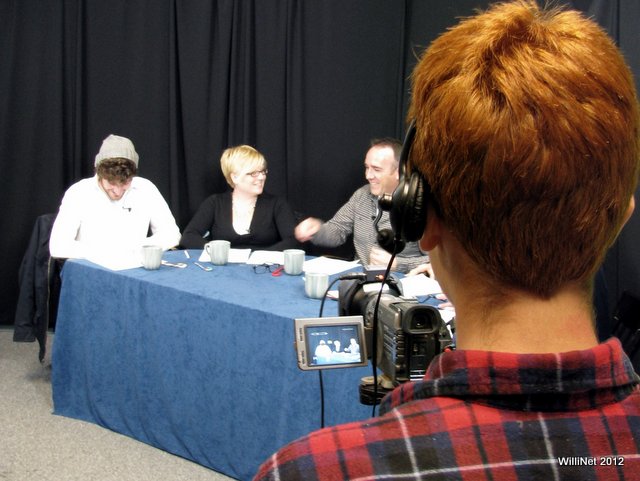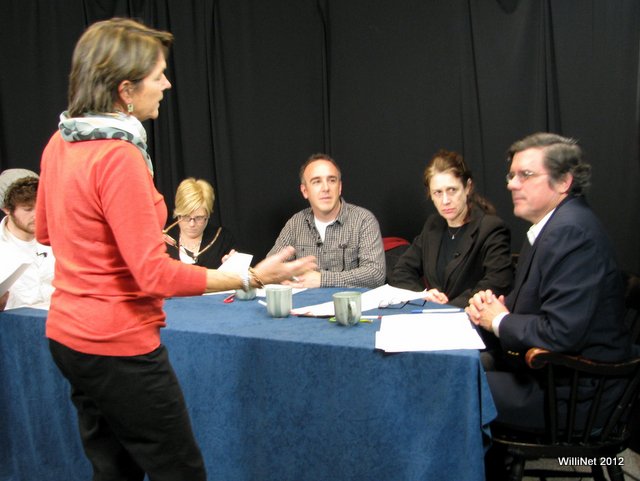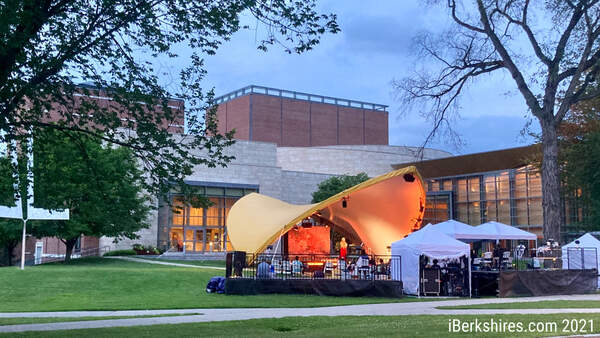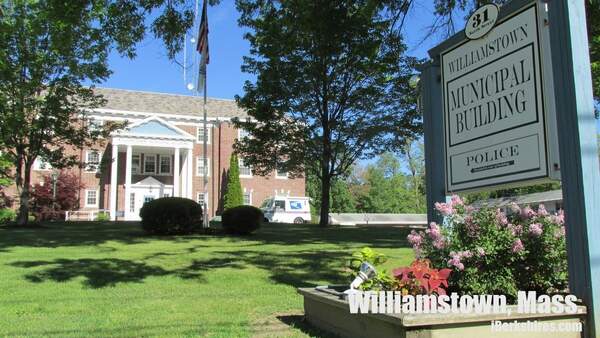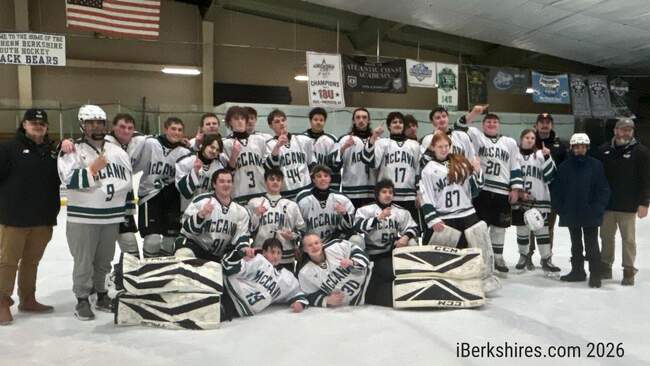Producers Hope 'Play Cafe' Sparks Writing Creativity
|
Sidney Smith prepares to shoot an episode of the 'Play Cafe' at WilliNet. The show premieres in January with a reading of 'Mary Durning's Soup and Other Cultural Divides' in January. |
WILLIAMSTOWN, Mass. — Three people sitting around a table reading from a manuscript may not seem like exciting television, but the creators of a new show on the town's community access television station hope "Play Cafe" will spark creativity throughout the region.
"For me, it's always kind of nice to hear your work aloud," said Williamstown playwright Christopher Newbound, who is collaborating on the show, which hits local televisions on Jan. 15.
"One thing about a table reading is that by nature it's very much a work in progress. ... The readings are sometimes almost one of the best things you hear as a playwright. The actors aren't really acting. They're just reading the words."
"Play Cafe" offers playwrights a chance to hear their words performed by area thespians and, potentially, garner feedback from those actors and a wider audience through WilliNet and its website, which will allow viewers worldwide to "tune-in" and check out the works in progress.
Newbound was recruited by show creator Patti Cassidy, who is based in Rhode Island but is in town for the second time in five years while her husband occupies a chair at Williams College. The show grew out of a writers group in which she participated while living in Arizona, she said.
"It started because I'm a playwright also," Cassidy said of "Play Cafe." "When I lived in Tuscon for many years, I was part of the Old Pueblo Playwrights, a support group for playwrights. We had connections with directors and actors, and we'd write our stuff and work with directors and actors to give readings.
"It was phenomenal. You learn so much about the craft as you're doing it. ... It wasn't all theoretical. You actually develop plays.
"Once a year, they have a festival, and I was lucky enough to have my plays performed. .... It was a fabulous chance to get plays out there."
But the Old Pueblo group did not limit itself to productions on stage — not real stages, anyway.
"We also did some exciting stuff," Cassidy said. "Someone would say, 'Hey, does anyone have a play about art galleries?' and we'd get our scripts together and approach an art gallery. Or we'd get plays about a bar and approach bars and ask to do a reading. I like to have plays outside the box."
Or, in this case, inside the box.
Cassidy had volunteered at WilliNet the first time she lived in Williamstown, and she approached the station's Debby Dane about the possibility of producing a show. Dane put her in touch with Newbound, who not only plans to have one of his shows read on an upcoming episode but also agreed to help organize it.
"Play Cafe's" first episode features the work of another Williamstown playwright, Jane Denitz Smith, whose play "Mary Durning's Soup and Other Cultural Divides" explores issues of class, Cassidy said.
The show was filmed this month and will kick off the "Play Cafe's" run on WilliNet beginning next month.
The show's producers originally hoped to use actors who are members of the union Actors Equity, but learned that they would have to pay the performers scale and — since the show would be telecast — involve the Screen Actors Guild as well. They instead switched gears, drawing on the region's ample population of quality non-union performers, Cassidy said.
And that is not the only change that "Play Cafe" has undergone since it was originally conceived.
Originally, producers had hoped to limit the show to works produced by Berkshire County playwrights, but when it became clear they may not have enough works to sustain the show long term, they opened it up to writers from throughout the Northeast. And the response was strong.
|
WilliNet's Debby Dane works with the cast of local actors. The show will feature playwrights from around the region and interviews with writers, actors and others. |
"We widened the footprint to all of New England and New York, as long as (the playwrights) can attend the taping," Cassidy said. "We've gotten quite a few submissions — from Maine to Michigan — before we tightened it a bit. We've set a definite schedule with a new show up on the 15th of each month."
In addition to videotaping table readings of plays, the show will pull back the curtain for audiences and offer interviews with directors, set designers, lighting people and the like, Cassidy said. Those interviews will be telecast as separate episodes of the show.
"The heart of the show will always be the play readings," said Cassidy, who also emphasized that while "Play Cafe" will accept submissions from outside the region, its preference is to feature playwrights and other artists from the Berkshires.
That includes Newbound, who said "Play Cafe" has helped him creatively.
"One of the things it did was it gave me the incentive to write a play," he said. "When it first came up, I was going to pull something out of a drawer, but I challenged myself. Why not write something new."
And the process of doing a table reading helps writers like him bring their new vision to fruition, Newbound said.
"It's very helpful in terms of sharing it and listening to it a few times," he said. "First drafts are often overwritten and overly wordy and expository. To go over a play, you realize how much less is more. It just gives you objectivity over it that you don't have when you're in the middle of it all.
"Any time you hear a play, it's different than seeing a play on the page."
Tags: playwright, public television, theater, WilliNet,

